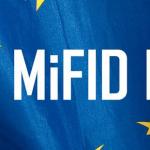As we get closer to 2018, the level of interest regarding the recordkeeping requirements of Markets in Financial Instruments Directive II (MiFID II) continues to increase.
As we have discussed in our previous post, MiFID II seeks to improve the transparency and oversight of financial markets and strengthen the protection of investors by introducing robust organizational and conduct requirements – such as the archiving of enterprise messages like SMS, voice call, email, and chat logs.
As guidance, we detail in this infographic a few considerations in preparation for company implementation, management, and preservation of communications in light of MiFID II’s anticipated implementation:
1. Ensure a Clear Classification of Regulated Communication Records for Archiving
Providing a clear definition of what constitutes a regulated communication record is vital to MiFID II compliance. As stated earlier, the MiFID II recordkeeping requirements are quite expansive, so the definition of the record should broadly include any communication related to a transaction or potential transaction, irrespective of whether it results in the conclusion of a transaction.
It should be clear that the record may encompass various business communication channels and media formats – including email, SMS, personal messaging platforms, and collaboration tools.
2. Define the Permissible Communication Channels in Your Company Policies
Clearly define the client communication channels in your company policies surrounding such areas as: order handling, execution, order placement and transmission, complaints handling, conflicts of interest and remuneration.
By making the acceptable methods of communication known among these areas, retrieval and preservation of all transaction communication can be reconstructed and maintained more efficiently.
3. Create a Recordkeeping Unit
Draw members of the team from legal, compliance, technology, and the management to help the whole organization understand the key distinctions between MiFID and MiFID II, and all other recordkeeping requirements that pertain to the firm. This unit shall be responsible for the overall maintenance of any archiving platforms deployed on different operating systems (Android and iOS) such as text message archiver.
4. Implement Access Restrictions for Official Business SMS Messaging Applications
MiFID II is just one of the many regulations that requires enterprise SMS archiving in order to address the proliferation of consumer SMS apps in the workplace. As such it is imperative to create policies regarding administrative access restrictions for the official business text messaging channels and applications that are being used to communicate business-related information to clients, vendors, etc. Doing so will help maintain a centralized control over the company-owned digital assets, as well as reduce the risk of unauthorized deletions of regulated communications.
5. Ensure Continuous Testing and Improvement
Periodically test the new MiFID II policies, processes and procedures to confirm their recordkeeping compliance with the new regulations and the quality of the outputs. In addition, conduct forensic tests to isolate outliers among the data.
6. Educate the Key Stakeholders
Make sure procedures for preserving communications are properly conveyed to the key stakeholders of the organization. An abundance of enterprise text messaging solutions exist in the market for a variety of media and applications, but chances are they won’t cover every possible communication facet within a company. This is particularly prudent with the MiFID II which requires client communication minute records to be created and preserved.
With proper planning for policies, procedures, and education, companies and organizations have better opportunity to increase readiness and likelihood of compliance with MiFID II’s early 2018 expansion.
TeleMessage, a worldwide leader in enterprise mobile messaging, electronic records search and analytics, is now listed in the Alternative Investment Management Association (AIMA) MiFID 2 vendor directory for its telephone recording and surveillance solutions.
The TeleMessage Mobile Archiver offers firms the most comprehensive mobile text archiving platform, allowing corporates to capture and retain mobile communication including SMS, MMS, and voice calls of their employees, as required by Markets in Financial Instruments Directive Article 51(3).
Contact TeleMessage today to learn how our platforms can help you achieve compliance with the implementation of MiFID II recordkeeping requirements next year.






